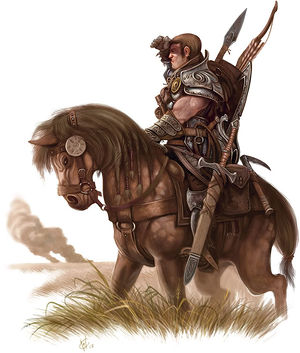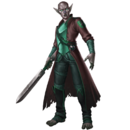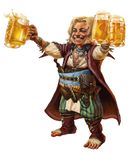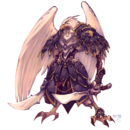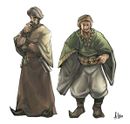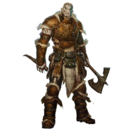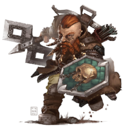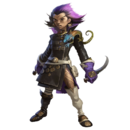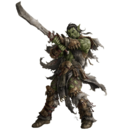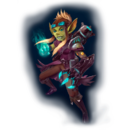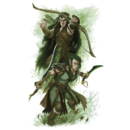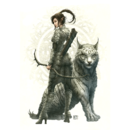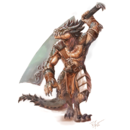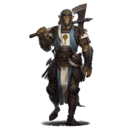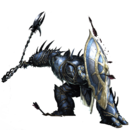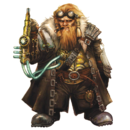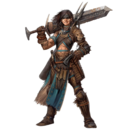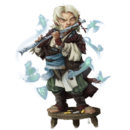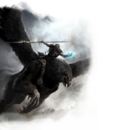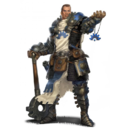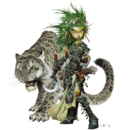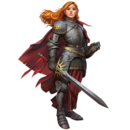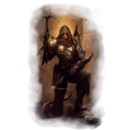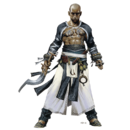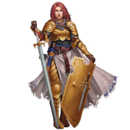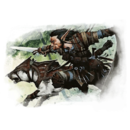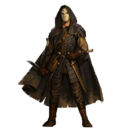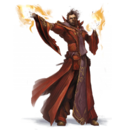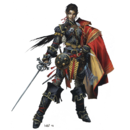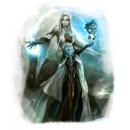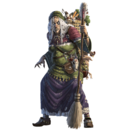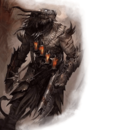Introduction to Tenebrae
Stats are secondary to a good attitude, and a willingness to step forward and work with others. They're the things we look for most.
We also look to maintain a safe, comfortable place where everyone can play. When settling down at our Gaming Table, then, don't be 'That Guy.' You know the one. The creepy, loudmouthed, or pushy one you'd never invite back to your table. We wouldn't want to invite 'that guy' back to ours, either.
Step into Ea
Welcome to Tenebrae: Emblem of Ea Mux. We are a D&D 3.75/3.P (that is, Pathfinder) edition online role playing game set in a fantasy world of our own devising, the world of Gaea. Gaea is a world of swashbuckling action, epic adventure, larger-than-life characters and colorful cultures, nations and history. It is a crossroads of swords, sorcery and technology and home to many different species. Emblem of Ea is dedicated to providing interesting roleplay, adventure and atmosphere for online D&D play and we welcome any player willing to join our community and roleplay in our setting.
In this era, the adventuring community grows and thrives. Daring explorers and relic hunters dare the unexplored confines of the frontier in search of ruins, treasure, forgotten cities and lost secrets to bring back to the wealthy and the wise for study. Sky Pirates prowl the sky-routes of the immense airships while devout priests proclaim the will of the gods and decipher the prophetic mysteries of the song of creation.
Adventurers are rare in number but impact matters greatly. They face dangers that are inconceivable by the general populace and in some cases, their unique skills, talents and daring actions are the only things capable of standing up against creatures and things that would otherwise ravage and lay waste to society. Yet, even heroes have flaws, which both flavor and color them, adding richness to their story's tapestry.
The central location for the game is the fabled city of Alexandria. With its skyscraper-like castle towers and walls, rich mines and regional resources, Alexandria has earned for itself the moniker of the city of wonder. A metropolis, the city exists as a hub for trade, travel, political scheming and magical phenomena. Though it is a hub of activity, it exists as a pocket of civilization on the edge of the great wilds. Its location near the edges of the Frontier creates a rugged, adventurous and rustic attitude and way of life. It serves as our main setting piece and the story of its development is one of our main focuses.
Gaea is a world of diverse nations and cultures as well as races and sub-races. Humanity is by far the most common race; however, when all the others are taken into account, humans make up only about a third of the world's population. Methods of faith and worship are just as diverse: Ea is a world of polytheism.
Craft Your Concept
You may play your character for years, so spend some time on him or her.
1. Choose a Race or Class
The simplest place to start is to begin with a race or class that you find interesting. Each of the race and class pages has a "summary block" at the top. These summaries list (with links) common lands, common beliefs, and even typical roles or alignments.
These summary blocks are not exhaustive and are not intended to be restrictive--they're meant along the lines of helpful suggestions and a means if helping you get started.
| Races | ||||||||||||||||||||||||||||
|
| Classes | ||||||||||||||||||||||||||||||||||||
|
2. Choose a Deity
The people of Ea are largely pantheistic (Holy Order of Ea), though some may pay tribute to a specific god or deity. Some, particularly rangers or druids, are more closely aligned to nature deities and place them first and foremost (Green Word).
Your race or class page may help you decide on a deity. Or, feel free to browse the full list.
3. Develop the Background
Once you've put together a rough outline, you should begin work on the background. Backgrounds help you lay out your concept in words, and help staff understand just who this new person is. If you'd like some guidance there, we have a guide for that, too.
In addition to our guide, here are some websites we've found to be useful:
- Ideas for Character Backgrounds
- Ash's Guide (Note that all traits may not be appropriate, due to rating)
- ...others?
...obviously, we do not expect you to go into the detail many of these sites do. If you're having trouble writing, you might try this motivational site. There are kittens, and this, naturally, makes everything better.
Build Your Concept
1. Select your Attributes
Pathfinder offers six attributes to help you define your character. What stats you need is is determined by who your character is and what he or she does. Part of that is their character class. Each class page lists attributes that will be important to that class.
The average attribute of a "normal" person is 9-11. Heroes are above and beyond these numbers, however, and so Tenebrae offers a generous number of attribute points with which to build a character. This is not an invitation to minmax--rather, it is so you may build the character you want. Do not dumpstat.
Tenebrae uses the weighted point buy method of attribute purchase. This means, the higher the attribute, the more it will cost. For example, using the table below, we find that raising an attribute to a 16 costs 10 points. Tenebrae offers a starting pool of 32 points with which to purchase attributes.
| Attribute Costs | |||
| Score | Cost | Score | Cost |
| 7 | 0 | 13 | 3 |
| 8 | 0 | 14 | 5 |
| 9 | 0 | 15 | 7 |
| 10 | 0 | 16 | 10 |
| 11 | 1 | 17 | 13 |
| 12 | 2 | 18 | 17 |
| The Six Attributes | |||
| Stat | Definition | Applies To | |
| Strength (Str) | Your physical strength | Melee attack rolls and damage | |
| Dexterity (Dex) | Your reflexes, agility, and sense of balance | Ranged attack rolls, initiative, reflex saving throws, armor class (defense) | |
| Constitution (Con) | Health and stamina | Increases hit points, fortitude saves | |
| Intelligence (Int) | Learning and reasoning | Number of starting bonus languages, increases number of skill points, wizard and artificer spellcasting | |
| Wisdom (Wis) | Willpower, common sense, intuition | Willpower saving throws, skills such as healing, ranger and cleric spellcasting, perception, sense motive, and survival | |
| Charisma (Cha) | Personality, likableness, or physical "presence" | Checks that attempt to influence others, skill at intimidation, channel energy DCs for paladins and clerics attempting to harm undead, paladin and sorcerer spellcasting | |
2. Select Your Skills
Skills define the sorts of things a character can do. Rangers, monks, barbarians, and rogues tend to receive alot of skill points. Each class receives a set number of points every level, plus any bonus points from having a high intelligence. You may also receive bonus points from favored class, which is a concept we'll get to later.
Each skill rank costs 1 skill point. Class skills receive a bonus of +3 to the roll. The ingame code handles this automagically. A list of skills and what they do may be found on the skills portion of our website.
When you roll a skill, you will roll 1d20+Ranks+Attribute Bonus+Class Bonus against a Difficulty Class, or DC. The code adds these numbers for you automagically.
| Skill Points Per Class | |||
| Class | Points Per Level | Class | Points Per Level |
| Artificer | Monk | ||
| Barbarian | Paladin | ||
| Bard | Ranger | ||
| Cleric | Rogue | ||
| Druid | Sorcerer | ||
| Fighter | Wizard | ||
| Cavalier | Inquisitor | ||
| Swashbuckler | Witch | ||
3. Select Your Languages
If you have a higher intelligence (12+), you receive a number of bonus languages. Your race determines which languages you may select. If you're curious about what each language is, and perhaps a little of its history, visit our language page.
You may learn additional languages (and languages outside of your race's usual scope) by spending skill points in Linguistics. You gain 1 language per point spent. Aside from learning languages, Linguistics is also useful for knowing the history of a language, and to create and detect forgeries.
4. Select Your Feats
Feats are like mini-abilities that help define each character. Some feats stack (known as "feat chains"). There are three types of feats, based on the mini-abilities they grant:
- General: A general feat might give you bonuses to certain skills, or a boost to your AC. It might also do things such as let a cleric channel energy into a weapon during combat.
- Combat: Combat feats are focused on combat. These sorts of feats tend to be particularly useful to fighters, barbarians, paladins, and rangers. Fighters get quite a few bonus feats as part of their class, so will be able to select many of these.
- Metamagic: Metamagic feats alter the way a spell is cast, or its effects. These are particularly useful to wizards, though other spellcasting classes may enjoy them, too.
- Teamwork: Teamwork feats offer great benefits when possessed by more than one person. For this reason, they're most useful to classes with animal companions, or classes built around their use, such a cavalier or inquisitor.
Our feats page lists the types of feats available on Tenebrae.
5. Select Your Spells or Domains
Artificers, Bards, Inquisitors, Sorcerers, Wizards, Witches
If you are one of the above classes, you will select some starting spells.
In the beginning, you will not have many spells, though this will change as you progress. Therefore, don't feel compelled to build an enormous spell list. Instead, select a few level 0 and level 1 spells you would like to be able to cast.
So, go on ahead and head over to our spell selection to see what's there. As there are many spells, our class pages may also offer suggestions.
Inquisitors will also select a domain.
Cleric, Druid
If you're playing a cleric or a druid, you start knowing every spell on your spell list. You just "choose" which ones you want to cast each morning. This means you don't need to select any spells at this time...though you do need to select domains.
A cleric receives 2 domains from their divine patron. Each deity's entry shows your options.
Druids normally receive the service of a great animal through their connection with the earthly realms. However, druids may exchange this option for a different sort of divine bond--and receive the power of a single domain. If you would like to use this option, you may want to do a little reading on the druid page to see what's available.
Ranger, Paladin
Rangers, Paladins will gain spells later on in their careers and receive no domains, so nothing here applies to you. When you do gain spells, you know every spell on your spell list. You just "choose" which ones you want to cast each morning.
Complete Chargen, and Apply for Approval
Once you have your character in mind, head into chargen. You will do this by typing CG from the Gaming Table.
Chargen will start off by asking you to select your attributes, a process very similar to what we covered, here.
Once you're finished, the last room will instruct you to +apply.
Character applications may take anywhere from 24-72 hours.
Basic Mechanics
Terms to Know
Common terms found in Pathfinder are summarized here. Do not feel the need to memorize these. These will become familiar as you continue to play.
Making Rolls
Most rolls in Pathfinder look like this:
- +roll 1d20+Bonuses
You will always roll against some sort of target number. Equaling or beating this number means you have succeeded. Rolling below this number means failure--though failure does not always mean a humiliating fumble. For example--it could mean your character's sword struck the side of his shield, instead. Or, your character happened to glance over as a party member yelled out. The question to ask is "but why?" and then to build it into the storyline in a creative way.
Here are some examples of things you might roll for ingame. Our ingame dice roller is very flexible. For example, you could type +roll 1d8+1d6+14 and it would work. Feel free to play around, or see +help rolling dice for more dice commands than you can shake a stick at.
| Common Dice Rolls | ||
| To Do This | Roll This | Against This |
| Melee Attack | 1d20+BAB+Str | Opponent's Armor Class (AC) |
| Ranged Attack | 1d20+BAB+Dex | Opponent's Armor Class (AC) |
| Saving Throw | 1d20+Base Save+Attribute Bonus | Spell Difficulty Class (DC) |
Rolls for Combat
Rolls for combat are typically a d20 roll with your BAB and then an attribute added to it. BAB stands for "Base Attack Bonus" and is determined by your class. In game, just type +sheet. Your BAB is printed there, right under the Combat section.
| Rolling Initiative | |
| Roll +init | |
| Rolling Attacks and Damage | |
| Melee | |
| Attack at 1d20+BAB+Str, Then Roll | |
| 2-Handed Weapon | Weapon Dice+(Strx1.5) |
| 1-Handed Weapon | Weapon Dice+Str |
| 2 Weapons* | W1: Weapon Dice+Str W2: Weapon Dice+(Strx.5) |
| Ranged | |
| Attack at 1d20+BAB+Dex, Then Roll | |
| Bow | Weapon Dice** |
| Crossbow | Weapon Dice |
| Thrown Weapon | Weapon Dice+Str |
- * When attacking with two weapons, subtract 2 from each attack roll. One weapon must be light, and you will need to take the Two-Weapon Feat to do this.
- ** Some bows let you add strength damage.
Commands for Spellcasters
Commands for spellcasters may be found by typing +help spells ingame.
Additional Help
Tutorials
For help with some trickier parts of Pathfinder, feel free to browse our tutorials. These were put together by staff to assist with some more difficult to understand areas.
Combat Cheat Sheet
There's a combat "cheat sheet" available to help you keep track of things in combat. This may be saved locally as an Excel or Open Office (now Libre Office) file. You don't need to use this sheet, and some players don't use one. Others however, do, so it depends on what works for you.
Basic MUX Commands
There are a few commands that are unique to Tenebrae. For the most part, these may be found through our +help system. However, you might also enjoy:
- +today - Tells you the current time, date, and weather within the Emblem of Ea
- +map - Tells you where you are in Alexandria
- +where - Lists who's where
- +help - Our local help system
If you are completely new to MUXes or MUSHes, check out our Introduction to MUSHing.
Joining Plots
Plots and scenes are a part of Tenebrae, in addition to everyday and life roleplay. There are many ways to get into them:
- Legwork: Pay attention to rumors that show up ingame. Rumors are also echoed on the front page of this website with contextual links to help you get adjusted. If you're curious about it, we have a Legwork Guide to help you hit the ground running.
- Participate in Roleplay: Get to know other players by chatting at the Gaming Table. Also, DMs (Dungeon Masters) will sometimes "drop" a scene on a set of characters gathered on the grid. You'll also find more details, and meet more people.
- Reply to Posts: Reply to a +bboard post. Our DMs and PMs will post on the ingame bboard (+help bboard) about upcoming scenes. If they do so, send them an @mail (+help mail) that you are interested.
- Check +Events: DMs and Player Runners will post scenes to here, and to the ingame bboard. You can sign up for scenes using +events (type +help events).
Final Notes
Tenebrae operates on a sense of community and trust. That is, we trust you, as players, to be a part of this community, to respect its policies, and one another.
We do require basic grammar and spelling within the game. That is, use appropriate punctuation and make an effort at spelling. Run your desc and bg through a spellcheck before submitting it. We're a text-based medium, so how you present yourself reflects on how well others are able to understand you. Misunderstandings happen often enough over text, after all, and we don't want to add to it.
